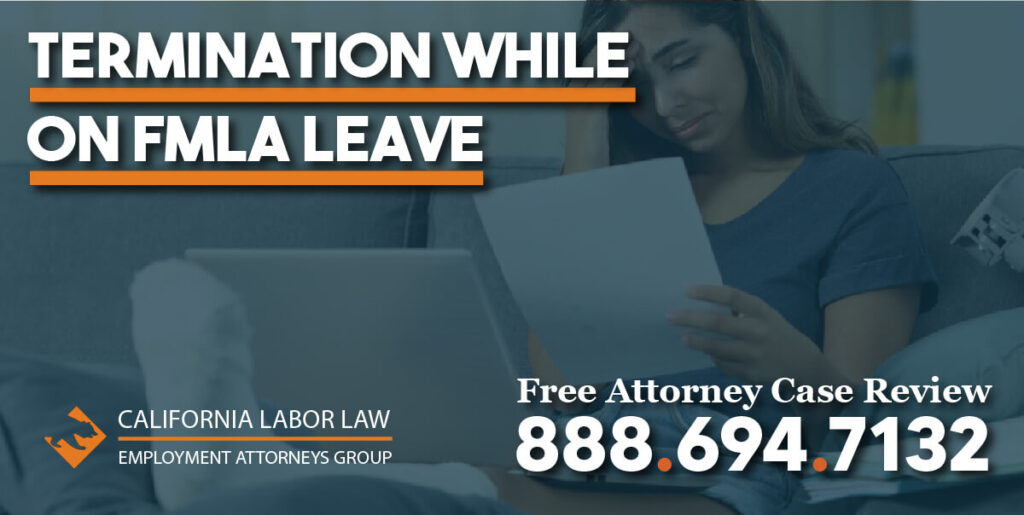Were you fired from your job while out on leave under the Family and Medical Leave Act? As someone who was unjustly terminated, are you left with questions and concerns regarding your legal rights?
How can I prove that my termination was illegal?
Can I take legal actions against my employer for taking away my job while I was out of medical leave?
What are the steps I need to take if I want to file a wrongful termination lawsuit?
Unfortunately, many employees are fired or face other negative consequences when they take time away from work for a serious medical condition or to take care of a family member that is seriously ill. If you wish to explore the option of suing your employer for wrongful termination, please contact our law firm as soon as possible.
The employment lawyers of California Labor Law Employment Attorneys Group are here for you 24/7. We are more than happy to provide you with a free consultation, where you can learn about your rights as someone who was fired after asking for or taking FMLA leave. Our track record of recovery speaks for itself, but at the end of the day, going through with a lawsuit is completely up to you. Our job is to help you make an informed decision, no matter which path you choose.

About the Family and Medical Leave Act
Commonly referred to as the FMLA, the Family and Medical Leave Act provides eligible employees with a specific number of weeks that can be used for unpaid leave. Under this statute, workers can have 12 weeks of leave within a period of 12 months for:
A serious medical condition
Taking care of a family member with a serious health condition
Birth / adoption of a child
Military caregiver leave
Military caregiver leave is given to workers who need to take care of a service member or veteran with a serious injury / illness. Qualifying individuals can have 26 weeks of job-protected leave to care for a spouse, child, parent, or next of kin.
Can I Be Fired While I’m on FMLA Leave?
No, you cannot be fired while you are out on leave that you qualify to receive under the terms of the Family and Medical Leave Act. Your employer is also forbidden from demoting you, cutting your pay, and taking other punitive measures because you requested or returned from extended leave. By doing so, they are in violation of federal and state anti-discrimination and retaliation laws.
While employers know the rules, they still try to get around them by stating another reason that you know to be untrue. They may, for example, say that your work performance has been less than satisfactory for months, or that customers and other employees have raised serious concerns about you. This way, they can get rid of someone who they view as an inconvenience or drain on their resources. Granted, in some cases a worker may have serious concerns that merit termination of their job, meaning that the employer is within their rights to fire them.
As you can see, this is a complex matter that requires careful thought and consideration. That’s why we encourage you to contact us and talk to a lawyer with experience in wrongful termination cases.
What can I Do if I was Terminated while on FMLA Leave?
So, what re the steps you can take if you suspect that you were unlawfully terminated, even though you are eligible for job-protected leave? Various legal options are available to you, and many people think about the prospect of filing a wrongful termination lawsuit.
Before you can file a lawsuit, you must file a formal complaint with one of two government agencies
The Equal Employment Opportunity Commission
The Department of Fair Employment and Housing
The EEOC is a federal entity, whereas the DFEH is an agency that’s under the State of California. A labor law attorney can advise you on which agency to file with and how to proceed based on their response. If you are sent a Right to Sue letter from either agency, this is the point where you can proceed with a lawsuit. It’s essential that you work with an employment attorney, who is experienced in suing for employer violations of the Family and Medical Leave Act.
For a detailed discussion of what you can do if you were terminated during FMLA leave, give us a call at your earliest opportunity. We look forward to speaking with you during a private consultation, completely free of charge.
Could I Receive Monetary Compensation?
If I was let go from my job while I was out of leave under the FMLA, can I sue my employer for compensation?
Yes, you may have grounds to sue your employer and obtain compensation if they fired you during job-protected leave, like taking time off for a medical issue under the Family and Medical Leave Act. If you are eligible for a lawsuit, what kind of payments can you receive? This is one of many subjects that you can go over with an employment rights attorney, which you will find here at California Labor Law Employment Attorneys Group.
In order to alleviate your financial burdens and help you move forward after a wrongful termination, we will strive to bring you some or all the following:
Lost wages that resulted from termination under illegal circumstances (back and front pay)
Value of job-related benefits, like retirement contributions, health care and life insurance
Compensation for long-term emotional distress caused by wrongful termination (pain and suffering)
Punitive damages may be awarded in court cases where a jury finds the employer guilty of gross negligence / misconduct
Our legal team can answer any questions you have about these damages and how much you can potentially recover as a victim of wrongful termination.
Deadlines in a Case for Wrongful Termination
Claims for wrongful termination and other labor violations have strict timelines. Keep in mind that the statute of limitations depends on the specific action you are taking and the type of claim you are filing. For example:
You generally have 180 days from the date of a wrongful termination to file an employment rights complaint with the Equal Employment Opportunity Commission, though some cases will have deadlines of up 300 days.
If you are granted permission to sue your employer, you have 90 days to file a lawsuit from the issue date on the Right to Sue letter.
If you are seeking relief with California’s Department of Fair Employment and Housing, you have 1 year to file a claim.
Upon receiving a Right to Sue notice from the DFEH, you have 1 year to petition the court system for a lawsuit.
It’s essential that you thoroughly understand these deadlines and how they apply to your own situation. Otherwise, you may not take action within the statutory timeframe and lose the chance to file a wrongful termination lawsuit against your employer.
Help from Lawyers that Specialize in Wrongful Termination
The FMLA is meant to provide employees with leave time when they are seriously ill, just gave birth or adopted a child, or need to take care of a family member with a medical condition. Unfortunately, an unscrupulous employer can use extended leave an opportunity to get rid of someone. Those who are wrongfully terminated can fight back against such practices and obtain compensation to help with their financial burdens.
The employment law experts at our law firm are standing by to assist you. At this time, we know that paying for an attorney is impossible for most claimants, and that’s why we accept all cases on contingency. As a result, our payment comes at the end of your case, and only you receive compensation from the party you are suing. So, you do not pay any fees upfront, nor do you pay us a single penny in the event we do not win your case.
Please contact the employment lawyers of California Labor Law Employment Attorneys Group today and schedule a free case evaluation.

